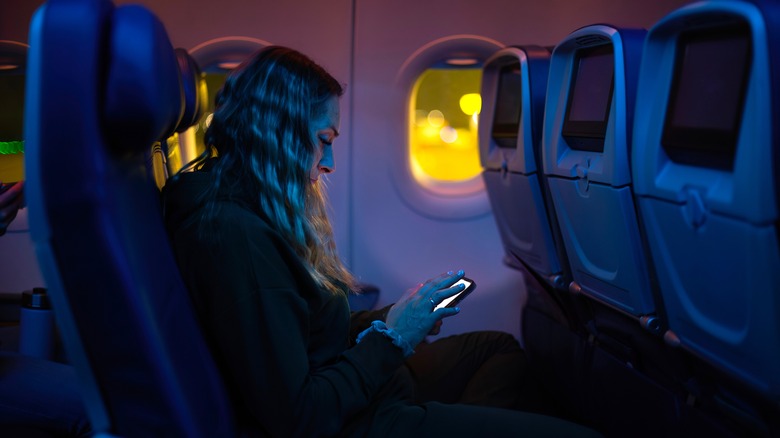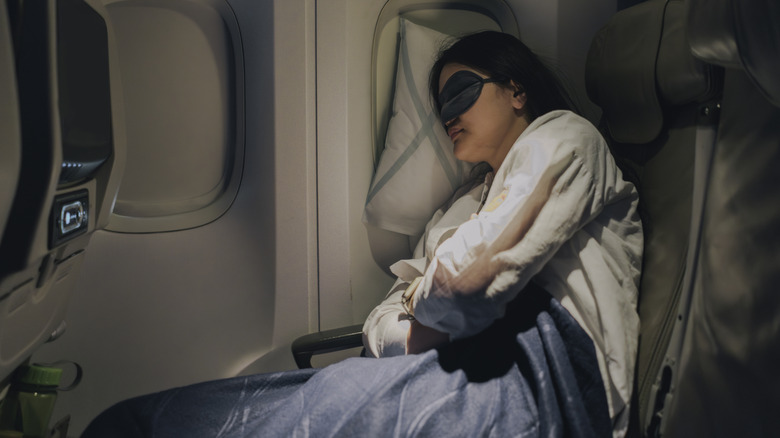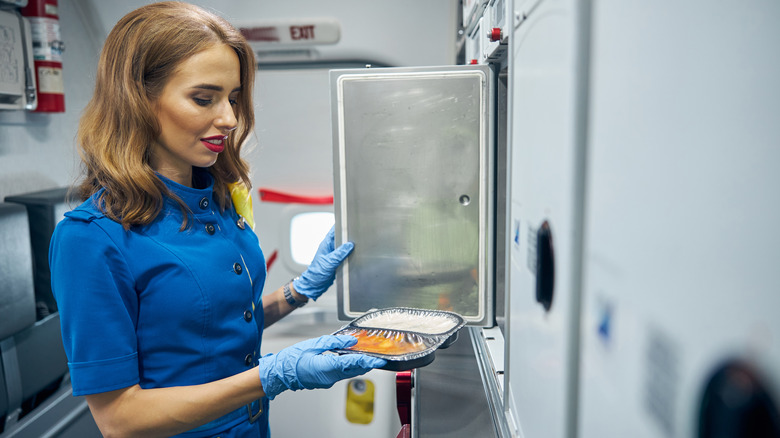Why Flight Attendants Recommend Eating Before You Board A Red-Eye Flight
Red-eye flights are notorious for being a nightmare — especially if you're someone who can't fall asleep anywhere but your own bed. While there are certain seats you can book to make your red-eye more bearable, the idea of being crammed into a metal tube during your prime sleeping hours isn't exactly appealing. Plus, there's the unspoken etiquette around reclining your seat — not ideal if you're trying to catch some quality zzz's.
Red-eyes do save you money, so if you're more about pinching pennies than avoiding a stiff neck, go ahead and book that midnight special. But for the rest of us who don't plan on raw dogging the flight or grinding away on their laptop, sleep is the only way to survive. And if you're hoping to snooze most of the way, flight attendants recommend eating before you board. Flying hungry is just setting yourself up for misery.
Now, eating before a flight doesn't mean inhaling half a buffet. As flight attendant Emily from the Wear I Wandered blog points out, boarding a red-eye on an empty stomach is a rookie mistake, but you don't need to go overboard. "Try to have something light to eat before you get on the plane even if it is just a bagel or a piece of toast," Emily wrote. "You can even pack a snack the night before to bring with you on your early morning flight." But eating too much pre-flight can leave you feeling queasy if turbulence hits.
Eat before boarding if you plan to sleep throughout the flight
If you're crossing time zones and bracing for jet lag, the smartest move is to dedicate most of your flight to catching some sleep. With in-flight meal service taking up precious time, waiting around to eat just chips away at your snooze potential. Kris Major, a flight attendant with over two decades of experience, and chair of the European Transport Workers' Federation's Joint Aircrew Committee, told CNN that frequent travelers skip the in-flight meals (presumably having eaten before boarding) and go straight to sleep. "The seasoned travelers, after takeoff, you go down the cabin and you can see that they're gone — they've covered themselves up and they're asleep," he said.
If you plan to eat but unintentionally pass out (it's a red-eye, after all), don't expect the flight attendants to rouse you for meal service. Flight attendants are trained to let sleeping passengers lie, so if you doze off, you could wake up to find you've missed the food cart entirely. "Flight attendants aren't supposed to wake you up. A lot of people actually don't want to be disturbed during the flight & they would be highly annoyed if we did," one user wrote in the sub-Reddit r/flightattendants. "With that being said, if a flight attendant skips you because you were sleeping and you still want to be served, we just expect you to let us know and we will gladly bring you your meal or drink/snack!"
What flight attendants like to eat before and during flights
If you've got some time to eat before your red-eye — or any flight — take a page from flight attendants' books when deciding what to munch on. After all, they practically live in the sky and know what works. Another user on r/flightattendants swears by meals that are filling but not overly indulgent: "Eat before. Overnight oats, Jimmy Dean egg white/turkey sausage muffin, and Boost protein shake are some of my go-tos."
When it comes to in-flight dining, many flight attendants don't rely on crew meals because, well, plane food isn't exactly Michelin-star quality. Plus, in-flight meals aren't always the safest and healthiest. Instead, they bring their own, so you might want to consider doing that as well.
"I like to bring food," Tamzan Miller, a flight attendant for Delta Air Lines, told The Points Guy. "Some flight attendant staples are: potatoes or sweet potatoes wrapped in foil to cook on the airplane, canned fish (tuna, salmon, sardines), apples, oranges, almond butter, hard-boiled eggs, packaged salads, cereal, oatmeal and hot sauce."
And whatever you do, steer clear of salty snacks. Ever heard of "airplane belly"? Bloating at 30,000 feet is a very real thing. "Avoid salt, carbonation and coffee! They all cause excess bloating and can make you very uncomfortable," Thomas Hafner of Norwegian Airlines shared with The Points Guy. "If I can't name the ingredients by just looking at the food, I don't eat it!"


